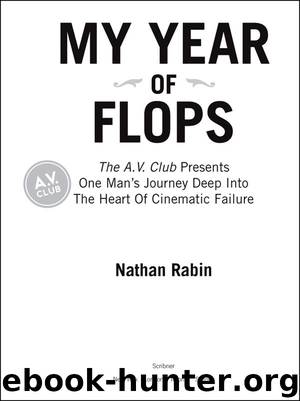My Year of Flops: The A.V. Club Presents One Man's Journey Deep into the Heart of Cinematic Failure by Nathan Rabin & A.V. Club

Author:Nathan Rabin & A.V. Club [Rabin, Nathan]
Language: eng
Format: azw3
Publisher: Scribner
Published: 2010-10-08T04:00:00+00:00
Big Green Brooding Case File #100: Hulk
Originally Posted January 8, 2008
2003’s Hulk is perhaps the highest-grossing film I’ve written about, having brought in a gaudy $62 million in its opening week. But the film’s box office nose-dived once poisonous word of mouth spread. Hulk represented a perverse case of bait and switch. The ads, poster, title, and fast-food tie-ins promised dumb fun about a big green monster who goes around smashing things. Instead, director Ang Lee and screenwriter James Schamus delivered an austere, cerebral exploration of the plight of an existential nowhere man. They screwed up a perfectly good smash-’em-up comic-book monster movie with their infernal “art” and “ideas.”
Hulk is driven by two seemingly antithetical concepts. Lee set out to make a live-action issue of The Incredible Hulk that borrowed heavily from the visual vocabulary of comic books. So he divided the frame into panel-like segments via split screens, and employed cartoonish transitions. Second, he set out to elevate the plight of a humble scientist/giant green brute to the level of a Greek tragedy. To the eternal regret of Universal shareholders, he succeeded. He delivered a comic-book movie for folks whose idea of comic books involves Daniel Clowes, Chris Ware, and maybe Art Spiegelman. Its target audience is New Yorker subscribers rather than acne-ridden teenagers.
The film’s opening echoes the elliptical storytelling of comic books. It begins in the ’60s with the formative trauma of its protagonist’s life: being ripped away from his birth family and placed with an adoptive family. The boy, irreparably scarred by his mother’s death and his father’s unexplained absence, grows up to be scientist Bruce Banner (Eric Bana). The deeply repressed scientist sulks until enraged, at which point he transforms into a green giant with an appetite for destruction. He’s a good enough guy, but you wouldn’t like him when he’s angry.
Bruce soon gets a visit from his long-lost father (Nick Nolte), a maverick mad scientist with a look heavily indebted to late-period Unabomber. Bruce winds up waging a three-sided war against his crazy father, his own temper, and General Thaddeus “Thunderbolt” Ross, a gruff, authoritarian general played by longtime mustache enthusiast Sam Elliott.
In its first hour, Hulk boasts a hushed intensity that could easily pass for tedium. It’s a bravely quiet film filled with solemn conversations conducted in near whispers. The Hulk doesn’t appear in all his muscled-up glory until about 40 minutes in. Audiences who missed the opening credits could be forgiven for thinking they’d accidentally stumbled into an art movie.
Lee seems to go out of his way to avoid indulging in anything that might be considered fun. He appears hell-bent on denying a blockbuster audience the visceral kicks they angrily demand. Lee’s Hulk smashes, but mostly he broods and aches. I appreciated the film’s intelligent subversion of the comic-book movie. Yet me also like when Hulk smash stuff. Everyone does. That’s why not even the film’s failure could kill off the franchise.
Hulk can be chilly and inert in the early going, but it
Download
This site does not store any files on its server. We only index and link to content provided by other sites. Please contact the content providers to delete copyright contents if any and email us, we'll remove relevant links or contents immediately.
| Anthropology | Archaeology |
| Philosophy | Politics & Government |
| Social Sciences | Sociology |
| Women's Studies |
Cecilia; Or, Memoirs of an Heiress — Volume 1 by Fanny Burney(31360)
Cecilia; Or, Memoirs of an Heiress — Volume 3 by Fanny Burney(30957)
Cecilia; Or, Memoirs of an Heiress — Volume 2 by Fanny Burney(30913)
The Great Music City by Andrea Baker(21819)
We're Going to Need More Wine by Gabrielle Union(18092)
Bombshells: Glamour Girls of a Lifetime by Sullivan Steve(13125)
Pimp by Iceberg Slim(12957)
All the Missing Girls by Megan Miranda(12789)
Fifty Shades Freed by E L James(12470)
Talking to Strangers by Malcolm Gladwell(11922)
Norse Mythology by Gaiman Neil(11919)
Crazy Rich Asians by Kevin Kwan(8381)
Mindhunter: Inside the FBI's Elite Serial Crime Unit by John E. Douglas & Mark Olshaker(7860)
The Lost Art of Listening by Michael P. Nichols(6494)
Enlightenment Now: The Case for Reason, Science, Humanism, and Progress by Steven Pinker(6422)
Bad Blood by John Carreyrou(5790)
The Four Agreements by Don Miguel Ruiz(5538)
Weapons of Math Destruction by Cathy O'Neil(5061)
We Need to Talk by Celeste Headlee(4890)
